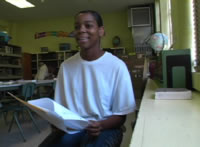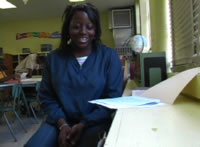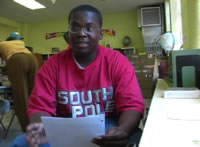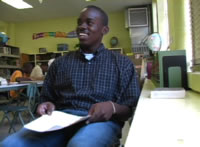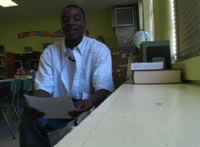| |
| STUDENT LETTERS, 11th grade, Period 6 |
As one way of getting to know my students early in the year, I ask my students to write a letter to me pretending that ten years have passed since their high school graduation. Typically, I reply to each student. I find this to be a useful way to learn more about each student's interests, hopes, and dreams.
Below, click on photo to view video clips of students reading their letter. (Click to view larger images of student letters.)
|
|
(Corrected title SLIDE forthcoming)
|
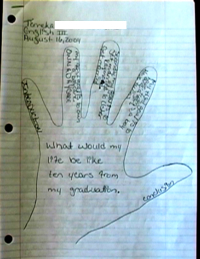 Brainstorming ideas Brainstorming ideas
|
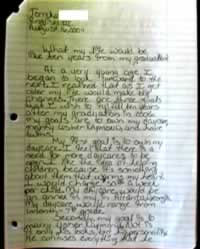
Letter, page 1 |
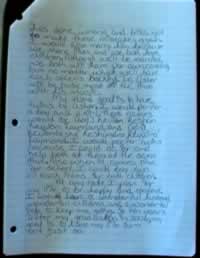
Letter, page 2
|
|
|
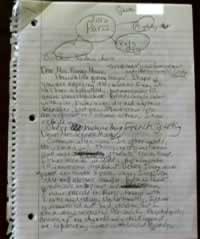
First draft, page 1

First draft, page 2 |
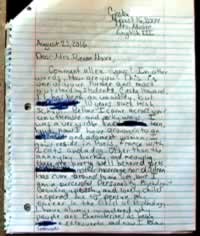
Second draft, page 1

Second draft, page 2
|
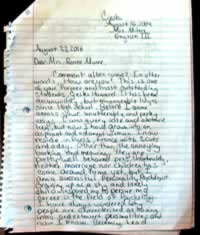
Letter, page 1

Letter, page 2 |
|
|
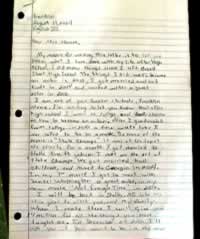 Letter, page 1 Letter, page 1

Letter, page 2
|
|
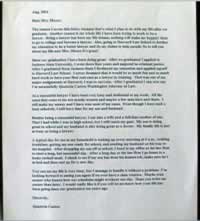
Letter |
|
|
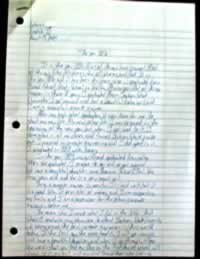
Draft, page 1

Draft, page 2
|
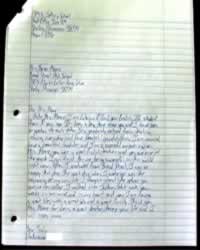
Letter
|
|
|
|
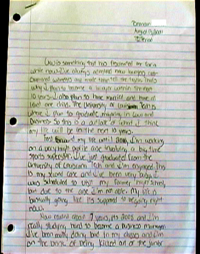
Letter, page 1
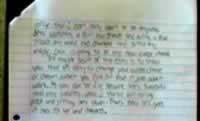
Letter, page 2
|
|
|
| |
| ASSESSING STUDENT WORK |
| The following pdf documents are excerpts from 11th grade student impromptu essays written as part of their first nine weeks’ grading period exams. Each student did a prewriting and a rough draft. These excerpts are taken from their final drafts. My “marks” are reproduced here using the “Track Changes” feature on Microsoft Word. In the classroom, I would use highlighters and purple ink to make comments. For these examples, I did not include additional marks or comments I made to students about he quality of the writing or content (which I separate form remarks about their grammar and construction).
In the examples below, notice that I did not “mark” every grammatical error. Rather, I focused on certain patterns of error. I looked for any problem that the student seemed to make repeatedly, or the one feature that most made the writing difficult for the reader to understand. Once this area is identified (to me and to the student), we can begin to develop ways to address that issue (commonly referred to as an instructional intervention). More specific information can be found in the Teacher Narrative that accompanies each example as well as the video clips below.
Grammar problems in our students’ writing or their scores on tests of grammar may at first make the challenge of instruction seem overwhelming even impossible. Read a pdf file with an example of some data analysis that I did of my students' performance during one year of my research study.
|

Essay 1
|

Essay 2 |

Essay 3 |

Essay 4 |

Essay 5 |
| |
Assessing student writing (2) |
(mm:ss) |
 |
| I discuss student essays 1-5, above. Includes a discussion of how standardized testing affects how I approach the teaching of writing. |
play
|
Quicktime Player
high • low
get plugin |
Windows Media
high • low
get plugin |
|
Assessing student writing (3) |
(mm:ss) |
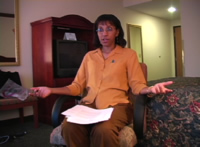 |
| I continue discussion of student essays, including how to address "errors" when students try to venture into new territory as writers. |
play
|
Quicktime Player
high • low
get plugin |
Windows Media
high • low
get plugin |
|
Assessing student writing (4) |
(mm:ss) |
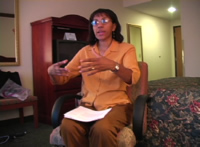
|
| I discuss a piece of student work that is particularly problematic (#5) because the work is still in a very early stage. This particular type of writing tends to trouble new teachers because they may make the mistake of trying to "polish" a draft that is really a piece of free-writing that needs more work. |
play
|
Quicktime Player
high • low
get plugin |
Windows Media
high • low
get plugin |
|
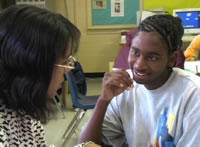 Culturally Engaged Instruction:
Culturally Engaged Instruction: 